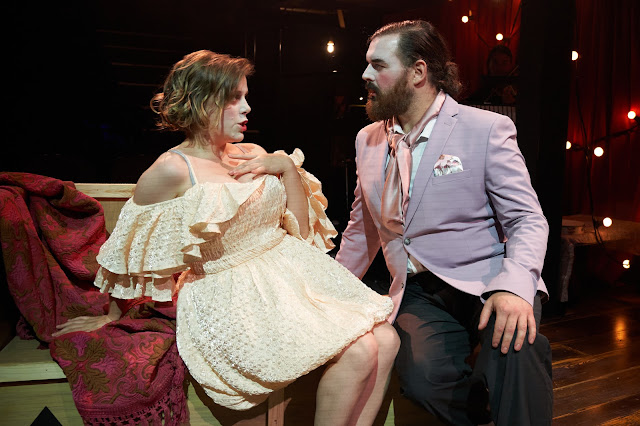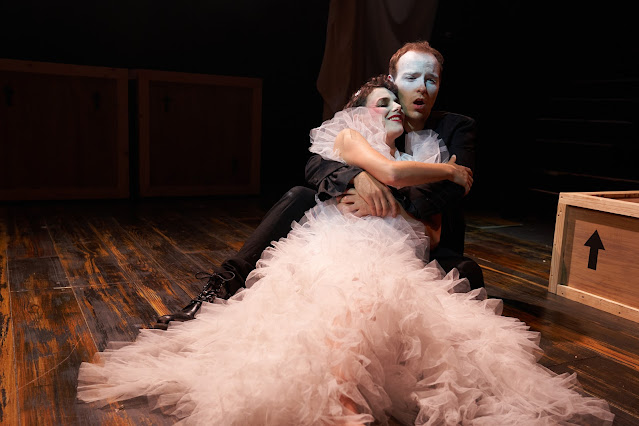 |
| Sorozábal:Black, el payaso - Michael Lafferty, Giuseppe Pellingra - Cervantes Theatre at Grimeborn Festival (Photo: Elena Molina) |
Reviewed 2 August 2022 (★★★★)
A fantasy plot, that hid themes of exile and revolution in plain sight, is at the heart of this 1941 Spanish operetta full of lovely melodies and with musical links to Berlin music-theatre and Viennese operetta from the Silver Age
Pablo Sorozábal, who died in 1988 at the age of 91, was the last representative of the romantic Spanish zarzuela tradition. He is perhaps best known internationally for the romanza 'No puede ser' (from his 1936 zarzuela La tabernera del puerto) which was sung by Placido Domingo at the Three Tenors concert!
There was a rare chance to hear Sorozábal's work in London when the Cervantes Theatre presented the UK premiere of Sorozábal's Black, el Payaso (Black, the Clown) at Arcola Theatre's Grimeborn Festival (seen 2 August 2022). Paula Paz directed with Michael Lafferty as Black, Raphaela Papadakis as Sofia, Giuseppe Pellingra as White, Juliet Wallace as Catalina, David Powton as Marat and Charles Dupont, and Simon Bundock as the child. Sets and costumes were by Caitlin Abbott with lighting by Lucia Sanchez. Ricardo Gosalbo was the music director and had made the musical arrangement whereby accompaniment was provided by him on piano and Elena Jauregui on violin, percussion and, at one point, toy trumpet. The libretto was adapted by Ignacio Garcia and translated by Simon Breden. The work was presented with English dialogue and sung Spanish.

Sorozábal:Black, el payaso - Juliet Wallace, David Powton - Cervantes Theatre at Grimeborn Festival (Photo: Elena Molina)
Anyone expecting a Spanish theme to the evening was going to be disappointed. As well as Spain, Sorozábal trained in Leipzig and Berlin, where he studied with Friedrich Koch (in preference to Schoenberg). Interestingly amongst Koch's other pupils are Kurt Weill and Boris Blacher. Sorozábal described Black, el Payaso as an operetta, and its Ruritanian theme and musical style align it very much with late Viennese operetta. Sorozábal's music includes a csardas and 'gypsy music', as well as more modern elements such as a tango, whilst the plot (based on a French novel, La princesse aux clowns of 1923 by Jean-Jose Frappa) involves a country on the Black Seas which has had a revolution and a group of emigres in Paris.
But the sheer fantasy of the plot meant that it got past the censors. Black, el Payaso was premiered in Barcelona in 1942; the Civil War had not long ended, Franco was in power, Sorozábal was a liberal and out of favour. The opera was just fantasy wasn't it?
Of course not. The work deals with recovering from Revolution, and has history and memory as one of its themes, remembering what happened so that it can never happen again. And the fantasy plot gives us the idea of the artist triumphant, Black the clown becomes the new king by accident, but is good at it whilst his colleague White the clown makes a superb first minister. They rescue the country.
There is another theme too, one of class. Princess Sofia is convinced that Black is her fiance Prince Daniel because Black plays a melody that only Daniel knew, that Daniel wrote for her. Except, of course, the Princess' world view does not include those of other classes. Black's father was the goldsmith who worked on the gold plate on which Daniel's melody was engraved. Black learned the melody whilst his father worked on the plate, and throughout the piece there is his insistence that Princess Sofia love him as Black the clown, not because she thinks he is Prince Daniel.

Sorozábal: Black, el payaso - Raphaela Papadakis, Michael Lafferty- Cervantes Theatre at Grimeborn Festival (Photo: Elena Molina)
Black, el Payaso is quite a large scale work, we missed Sorozábal's orchestration (he was a fine conductor) and the chorus (one climactic chorus at the end was pre-recorded, the rioting populace off stage). Much of the dialogue was transmuted into a narration for a new character, the child, Simon Bundock who played with puppets in his bedroom; this implication, however, being obfuscated by the awkward positioning of the child's bedroom necessitated by the limited space at the Arcola.
The result was a swift compaction, running to a something over 90 minutes without an interval. Frankly, I think it needed an interval after Act One, and little was gained by running everything together.
Sorozábal's style is eclectic with a definite middle-European cast to it, moving between classic Hungarian-inflected operetta and more modern jazz-style elements, sometimes with a mordancy that approached Kurt Weill. The work rather made me think of eclectic works like Oscar Straus' The Pearls of Cleopatra [see Tony's review of the 2018 production at the Komische Oper, Berlin]. And what Sorozábal's melodies managed to do was to imbue his leading characters with emotion and character.
Michael Lafferty gave a profoundly moving performance as Black, the clown who falls in love with a Princess and happens to find himself King of a country, but who constantly worries that the Princess is in love with a mirage. Lafferty brought a beautifully expressive melancholy to his performance, and really captured our hearts. As his beloved, Sofia, Raphaela Papadakis brought out her essential nervy brittleness, the intensity of her need to return to her lost Prince and perhaps something of the way she has been damaged by the revolution.
Juliet Wallace was a complete delight as Sofia's unashamedly flirty sister Catalina, and it was she who got most of the naughtier up tempo numbers and Wallace revelled in this, a self-satisfied, seductive smile on her lips and some deft dance moves. Giuseppe Pellingra was charming as White, Black's clown colleague who often addressed the audience directly and who seemed to go through all the bewildering changes with a sense of detached amusement.
David Powton had the double role of Marat, the journalist who is more of a plot device than a character, and then Dupont the French pianist who turns out to be the real Prince and who has come back simply to satisfy his curiosity about the man pretending to be him. Powton had a tango number with Wallace, flirting delightfully, and then tugged heart strings with the Prince's melancholy romance.
Boiling a relatively large-scale operetta down to just eight performers in a small studio space is quite a challenge. Whilst there were moments when I wondered what Sorozábal had originally written, what the full work would be like, everyone really made this small-scale realisation work. Lafferty in particular made us care about Black, and all five singers were wonderfully engaged and captured our attention.
There is room for more exploration of Pablo Sorozábal's work and the way his music intersects with other contemporary European music theatre, but this UK premiere from Cervantes Theatre was a fine beginning and introduced audiences to Sorozábal's seductive sound world.
Black, el Payaso runs at the Arcola Theatre until 6 August 2022, and the production is at the Cervantes Theatre from 20 to 24 September 2022.
Never miss out on future posts by following us
The blog is free, but I'd be delighted if you were to show your appreciation by buying me a coffee.
Elsewhere on this blog
- Handel’s Alcina - a ‘first’ for Glyndebourne - joins other great Handel gems in the company’s repertoire such as Ariodante, Giulio Cesare, Rinaldo and Theodora - opera review
- Finely poetic: Ernest Chausson's early Piano Trio alongside works by his contemporary, Eugene Ysaÿe - record review
- Riotous comedy & humanity: Donizetti's L'elisir d'amore at West Green House Opera - opera review
- Serious Songs: Jess Dandy & Martin Roscoe in Schubert, Brahms, Wolf, Strauss at Wigmore Hall - concert review
- South Pacific: Stupendous performances from Julian Ovenden & Gina Beck head this striking new version of Rodgers & Hammerstein's classic - music theatre review
- Little Women & after: I chat to composer Mark Adamo about the UK premiere of his opera & more - interview
- Welcome to L'isola di Alcina: Glyndebourne's first production of Handel's opera - opera review
- French-style elegance, Italian lyricism and virtuosity: Adrian Butterfield in Leclair's violin sonatas - record review
- Prom 14: Flavours of late romanticism, Yamada and the CBSO in Rachmaninov and Ethel Smyth - concert review
- Sit back and enjoy: London Early Opera's engagingly virtuosic performance of Handel's pasticcio, Caio Fabbricio - record review
- More than just sisterhood: Mark Adamo's Little Women finally gets its UK premiere in Ella Marchment's imaginative production at Opera Holland Park - opera review
- From Bayreuth to Grimeborn: having assisted at Bayreuth Festival's new Ring Cycle, Peter Selwyn moves on to conduct the concluding parts of the Grimeborn Festival's ambitious Ring Cycle - interview
- Home











No comments:
Post a Comment